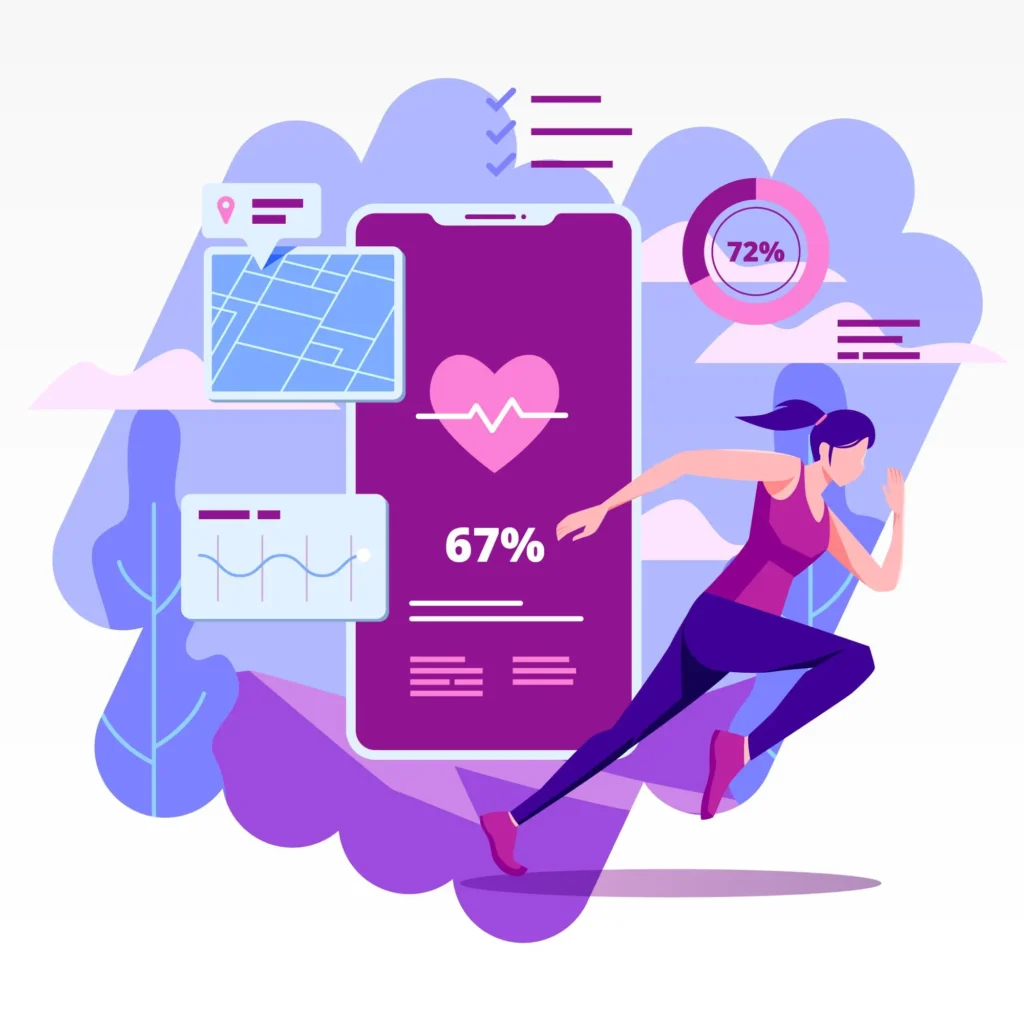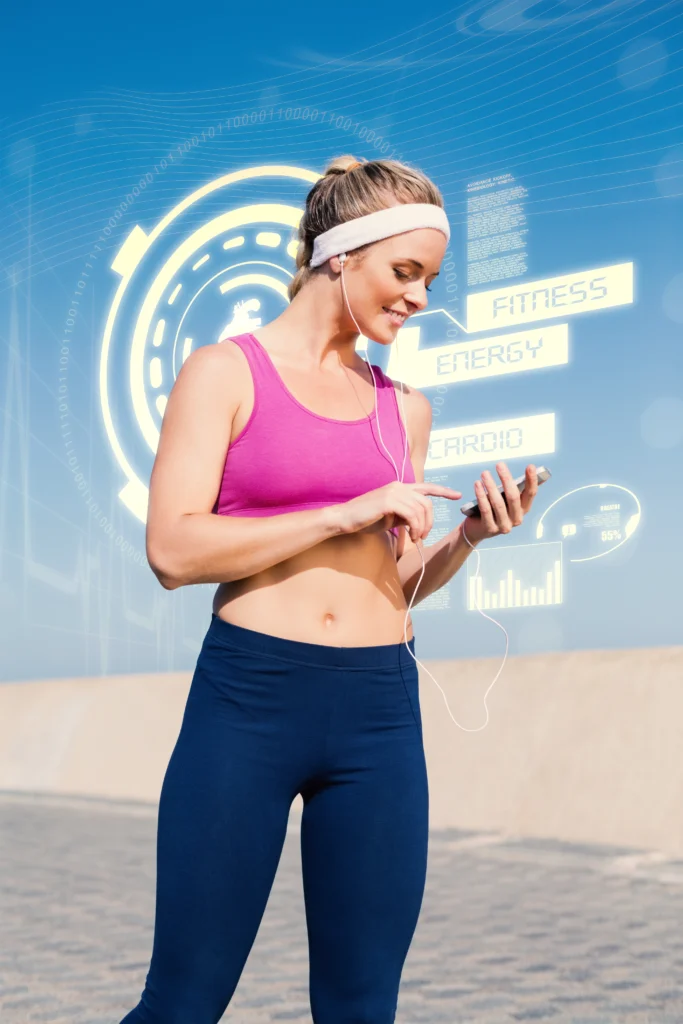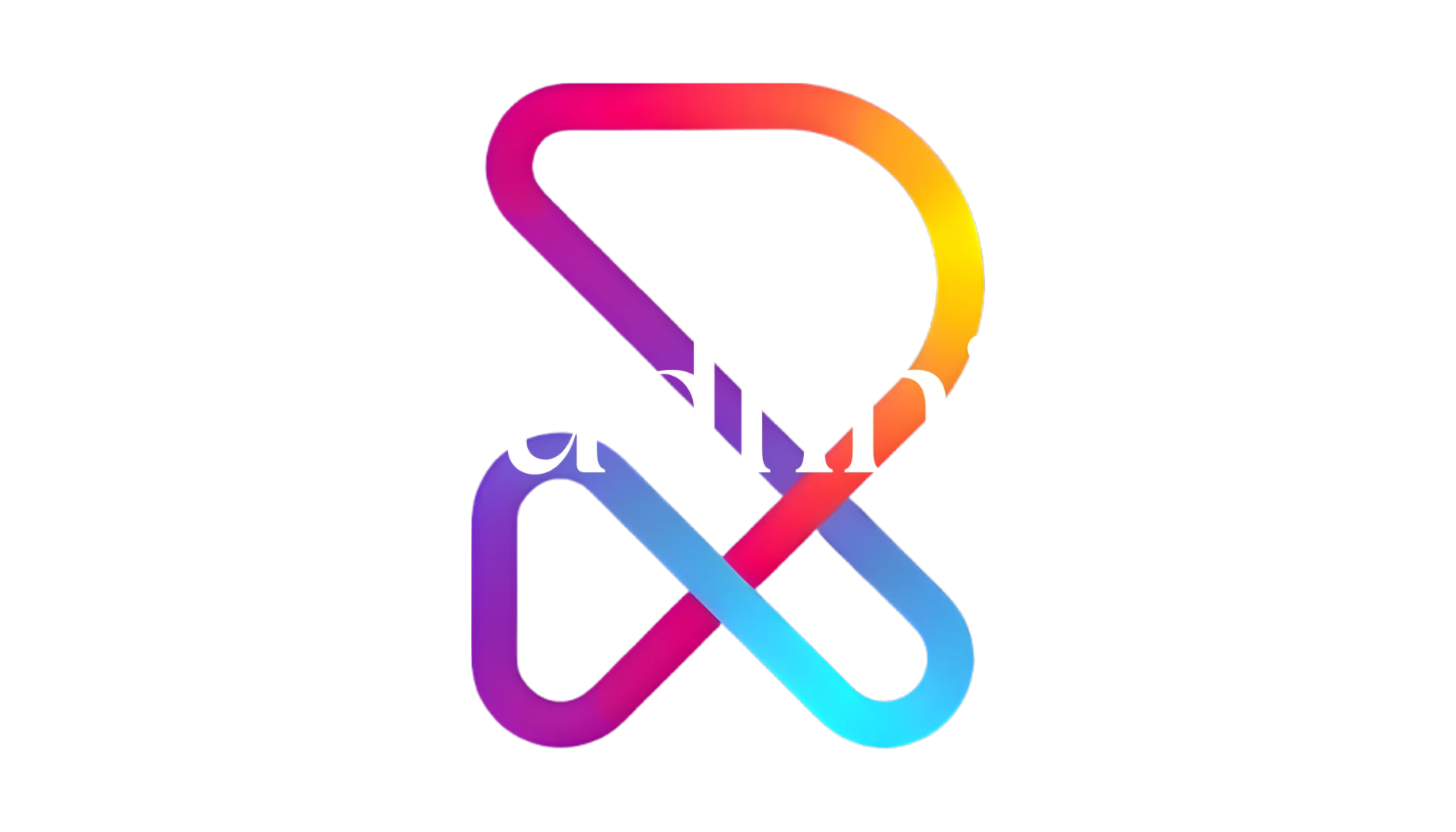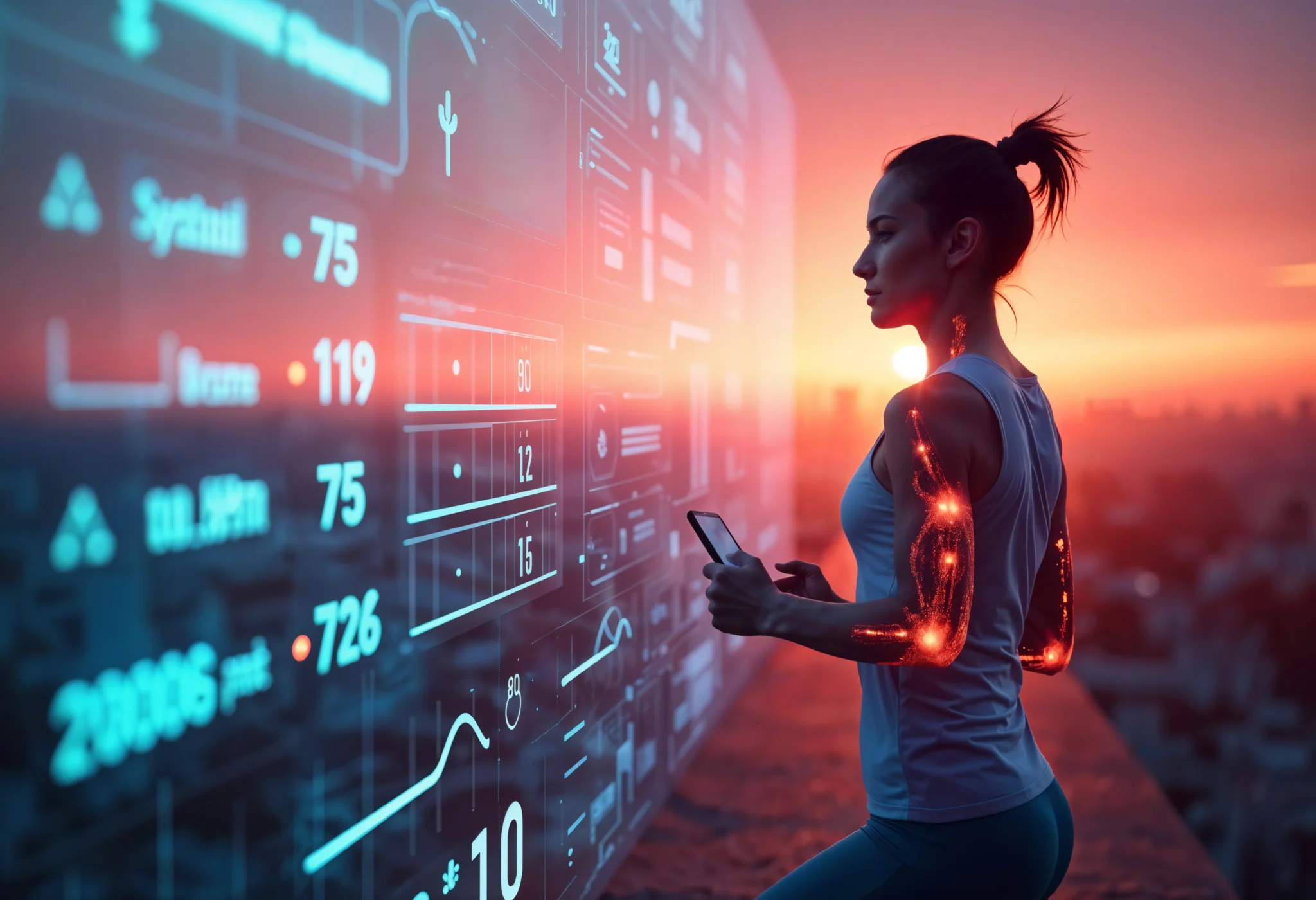Estimated Reading Time: 17-19 minutes ( 3,375 words)
Introduction
In the digital age, where technology intersects with every aspect of our lives, AI-powered health apps have emerged as a game-changer in the realm of personal wellness. With over 4.5 billion smartphone users worldwide (Statista, 2025), the adoption of mobile health technologies is soaring, especially in the face of an increasing desire for personalized wellness solutions.Imagine a world where your fitness, diet, and mental health are continuously monitored, analyzed, and improved with the help of artificial intelligence. Thanks to AI, this world is becoming a reality. By 2025, AI health apps are set to redefine how we approach our health and fitness, offering tailored recommendations and real-time insights that are more personalized than ever before.
AI-powered health apps are not just a trend; they are the future of personalized healthcare, giving you the tools to take control of your health like never before.
The demand for personalized health solutions has never been greater. From diet and exercise to mental health, people are looking for ways to optimize their well-being. However, the traditional healthcare system often lacks the ability to provide highly personalized care, especially for those who can’t afford or access regular healthcare services. This is where AI-powered health apps come in. These apps have the potential to bridge the gap, offering real-time analysis and customized advice based on individual health data, all at the click of a button.
In this blog, we’ll dive deep into the world of AI-powered health apps—how they work, their benefits, and why they are the must-have wellness tools for 2025. Whether you’re looking to track your fitness progress, manage your mental health, or receive personalized health insights, AI health apps can help you get there faster and more effectively.

What Are AI-Powered Health Apps?
AI-powered health apps are a category of software applications that utilize artificial intelligence (AI) and machine learning (ML) to enhance personal health management. These apps go beyond simple tracking; they use advanced algorithms to interpret health data and provide actionable insights. Their primary function is to analyze data gathered from wearable devices like smartwatches, fitness trackers, and smart scales. These devices monitor various aspects of a user’s health, such as physical activity, sleep patterns, heart rate, and calories burned, among others.
What sets AI-powered health apps apart is their ability to process this data in real-time, drawing on vast amounts of historical and current information to deliver personalized recommendations. For example, if a user has been particularly active throughout the day, the app might suggest additional exercise or a specific type of workout to continue their progress. Similarly, the app might notice irregular sleep patterns and offer advice on improving sleep hygiene based on the user’s specific habits and the data collected by the devices.
The AI algorithms are constantly learning and adapting, evolving with the user’s routines, preferences, and changing health conditions. This allows the app to become more attuned to the user’s needs over time, providing increasingly accurate and relevant advice.
AI-powered health apps serve as a bridge between raw health data and meaningful actions, offering users not just the raw data, but an interpretation of it, along with timely guidance that can lead to better overall health management.
How Do AI Health Apps Work?
AI health apps operate through a combination of data collection and machine learning algorithms. These two components work together to provide personalized health insights and recommendations that help users monitor and improve their well-being. Let’s break down how these apps work in detail.
1. Data Collection
The first step in the operation of an AI health app is the collection of data. This is done through a variety of means:
- Wearables: Devices like fitness trackers, smartwatches, or heart rate monitors continuously gather real-time data about the user’s physical activity, heart rate, sleep patterns, and even calories burned. These devices offer precise, continuous monitoring and sync the collected data to the app.
- Manual Input: Users can also enter data manually into the app, such as logging meals, entering exercise routines, recording mood or mental health status, or providing health-related metrics (e.g., weight, blood pressure). This enables the app to work with a broader spectrum of health data, even when users don’t have wearables.
- Sensors: Some advanced AI health apps may also integrate data from other sources, such as external sensors or connected devices like blood pressure monitors, glucose meters, or smart scales, to track additional health metrics.
2. Machine Learning Algorithms
Once data is collected, machine learning algorithms come into play. These algorithms process and analyze the data to identify patterns, trends, and correlations. The goal of these algorithms is to understand the user’s health status and make personalized recommendations. Here’s how they work:
- Pattern Recognition: The AI algorithms look for patterns in the collected data. For example, they may detect trends in physical activity levels, sleeping habits, or even changes in emotional well-being. They can identify if someone is more sedentary on certain days, if their sleep quality is poor, or if their diet lacks essential nutrients.
- Personalization: The algorithms use this pattern recognition to personalize the health recommendations for the user. For example, based on activity levels, the app might suggest a personalized workout routine. If sleep data shows poor rest, the app may recommend sleep hygiene tips or a bedtime routine to improve sleep quality.
Predictive Insights: Some apps even use predictive analytics to forecast potential future health trends. For instance, they may predict when a user might need rest based on increased physical activity or give early alerts if certain health metrics (like heart rate or stress levels) are trending in an unhealthy direction.
3. Step-by-Step Process of How AI Health Apps Work
- Step 1: Personal Data Input
The user begins by entering personal information into the app. This can include basic data like age, weight, height, fitness goals, and any relevant medical history. This helps the app tailor its insights to the user’s specific needs and health profile. - Step 2: Real-Time Data Collection
As the user goes about their day, the app collects real-time data from connected wearables or manual entries. For instance, a fitness tracker might record the user’s daily steps, heart rate, and the quality of their sleep. This data syncs to the app for continuous analysis. - Step 3: Data Analysis and Tailored Advice
The AI algorithms process the collected data to analyze patterns and draw conclusions about the user’s health. Based on these insights, the app offers tailored advice to improve the user’s health outcomes. This could include:
- Workout Suggestions: Personalized exercise routines or recommendations based on the user’s current fitness levels and goals.
- Sleep Tips: Advice on how to improve sleep quality, including recommendations for sleep duration, room temperature, or even a consistent bedtime schedule.
- Dietary Guidance: Tailored nutrition suggestions, such as meal plans or food recommendations, to help users meet their health or weight loss goals.
- Workout Suggestions: Personalized exercise routines or recommendations based on the user’s current fitness levels and goals.
The real beauty of AI health apps lies in their ability to integrate all the data points — activity, diet, sleep, mental health — into a cohesive strategy for overall well-being. These apps use advanced algorithms to turn raw data into actionable health insights, making it easier for individuals to lead healthier, more informed lives.

Top Features of AI Health Apps in 2025
AI health apps in 2025 are equipped with advanced features that offer users personalized health insights and support. These apps leverage artificial intelligence to enhance various aspects of well-being.
1. Personalized Fitness Plans
AI health apps create customized workout plans based on the user’s goals, such as fat loss or muscle building. They adapt to progress, ensuring that the workout intensity and routine remain aligned with the user’s fitness journey.
2. Sleep Tracking & Improvement
Apps like Sleep Cycle use AI to track sleep patterns and provide actionable insights to improve sleep quality. Personalized tips, such as optimal sleep times and relaxation exercises, help users get better rest.
3. Mental Health Support
Apps such as Woebot offer emotional support through AI-driven interactions. These apps guide users through mental health challenges, provide mindfulness exercises, and even use therapeutic techniques like Cognitive Behavioral Therapy (CBT).
4. Nutrition and Meal Planning
AI apps like Yuka and Nutrino help users assess the nutritional value of food, suggest healthier alternatives, and offer personalized meal plans based on individual goals like weight loss or muscle gain.
5. Wearable Device Integration
AI apps seamlessly integrate with wearables like Apple Watch and Fitbit, providing real-time health data. This allows users to receive continuous insights on their physical activity, sleep, and overall health, helping them stay on track with their fitness goals.
Benefits of Using AI for Personalized Wellness
AI health apps are revolutionizing wellness by offering personalized and real-time support to users. Here are the key benefits of using AI for personalized wellness:
1. Real-Time Health Monitoring
AI apps continuously track and monitor your health metrics, such as steps, heart rate, and sleep patterns. They provide real-time feedback and offer actionable recommendations based on up-to-date data, helping you make informed decisions about your health.
2. Tailored Recommendations
Unlike generic advice, AI health apps use your unique health data to deliver highly personalized recommendations. Whether it’s fitness routines, dietary plans, or mental health exercises, the suggestions are specific to your goals and needs.
3. Preventive Care
AI-powered apps can predict potential health risks based on your data trends, such as signs of stress or sleep disruptions. With early detection, these apps allow users to take preventive actions, such as adjusting their routines or consulting a professional, before issues escalate.
4. 24/7 Availability
AI apps are available around the clock, providing you with access to health insights and advice whenever you need it. Whether you’re at home, at work, or on the go, these apps offer continuous support without time constraints.
5. Improved Health Outcomes
By offering customized health plans and tracking progress, AI apps promote better health outcomes. They help users stay motivated and accountable, leading to improvements in fitness, diet, and mental well-being.
Real-Life Case Studies of AI Health Apps
AI health apps are becoming increasingly popular, providing personalized insights to users. Here are some real-world examples:
1. Apple Health & Fitness
Apple Health integrates AI to offer a comprehensive view of health data, such as heart rate, activity levels, and more. The app provides AI-driven workout recommendations, adapting based on the user’s activity patterns. This helps users improve their fitness over time with personalized advice.
2. Google Fit
Google Fit uses AI to track physical activity and health metrics, including steps, heart rate, and calories burned. Based on this data, it offers personalized recommendations to improve overall well-being, such as adjustments to workout intensity or suggestions for better sleep.
3. WHOOP
WHOOP is a fitness tracker that combines AI with data from heart rate variability, sleep quality, and physical activity. The app offers personalized advice for training and recovery, helping users optimize their fitness routine and avoid overtraining by analyzing their recovery status.
Comparison: AI Health Apps vs. Traditional Health Management
| Feature | AI Health Apps | Traditional Health Management |
| Personalization | Highly personalized, based on real-time data | Generalized advice from healthcare providers |
| Real-Time Monitoring | Continuous tracking and updates | Limited to appointments and check-ups |
| Accessibility | Available 24/7 on your smartphone | Available only during office hours |
| Cost | Low-cost or free for basic features | Expensive appointments, treatments, and check-ups |
| Data Analysis | In-depth, AI-powered data analysis | Basic analysis based on manual records |
FAQs Section
1- What are AI health apps?
AI health apps are digital tools designed to use artificial intelligence (AI) algorithms to analyze data collected from various sources such as wearable devices, sensors, and manual inputs. These apps aim to help individuals track and enhance their overall health and wellness. By processing data related to physical activity, sleep patterns, heart rate, diet, and more, AI health apps provide personalized recommendations, insights, and sometimes even predictive health outcomes. The goal is to assist users in making informed decisions about their health, whether it be exercise routines, diet plans, or mental health improvement.
2- Are AI health apps safe to use?
Yes, the majority of AI health apps prioritize user safety and privacy. They comply with global data protection laws like GDPR (General Data Protection Regulation) in the EU and HIPAA (Health Insurance Portability and Accountability Act) in the U.S. These regulations ensure that any personal health data shared within the apps is securely stored, anonymized, and protected from unauthorized access. However, it’s always good to check the privacy policies and terms of service of individual apps before using them to ensure that your data is handled securely.
3- Can AI health apps replace a doctor?
AI health apps serve as valuable tools for health management, but they do not replace the need for a medical professional. While these apps provide insights and recommendations based on data analysis, they are not equipped to offer medical diagnoses or perform clinical assessments. AI health apps are intended to complement professional healthcare, helping individuals track their progress, improve lifestyle choices, and communicate better with their doctors, but medical consultations and diagnosis should still be sought from qualified healthcare providers.
4- What kind of data do these apps track?
AI health apps monitor a wide variety of data points to offer personalized health insights. Commonly tracked metrics include physical activity (such as steps taken, exercise intensity), heart rate, sleep patterns, calorie intake, water consumption, mental health status (via mood tracking or stress levels), and sometimes even environmental factors like air quality. By compiling this data, the apps can assess your overall health trends, identify areas for improvement, and offer recommendations tailored to your needs.
5- Do I need a wearable device for AI health apps?
While wearables like smartwatches, fitness trackers, and heart rate monitors can significantly enhance the accuracy and real-time tracking of data, many AI health apps also allow users to manually input their health metrics. For example, if you don’t have a wearable device, you can still enter your daily steps, meals, mood, or sleep duration manually. However, integrating wearable tech typically leads to a more seamless and precise experience, as it continuously gathers and syncs data to the app automatically.
6- Which are the best AI health apps for 2025?
Some of the top-rated AI health apps for 2025 include:
- MyFitnessPal: A comprehensive app for tracking calories, exercise, and nutrition.
- Fitbit: A well-known app that pairs with Fitbit devices to track activity, sleep, and heart health.
- Woebot: A mental health app that uses AI to offer emotional support through text-based interactions.
- Nutrino: Focuses on personalized nutrition advice based on your goals and current health metrics.
These apps are popular due to their user-friendly interfaces, integration with wearables, and ability to offer personalized insights that help users lead healthier lives.
7- How accurate are AI health apps?
AI health apps can be quite accurate, especially when they integrate with high-quality, medically certified wearables and devices. Many apps use sophisticated algorithms that analyze large amounts of health data to provide recommendations. However, the accuracy can vary based on the quality of the app’s AI system and the devices it integrates with. Apps that are regularly updated and incorporate new research into their algorithms tend to provide more precise results. While they can be trusted for general health tracking, it’s always wise to consult a doctor for any serious health concerns.
8- Are AI health apps expensive?
Many AI health apps offer free versions with basic features, allowing users to track their health metrics without any cost. However, premium versions are often available through subscription plans, unlocking advanced features such as detailed analytics, personalized coaching, or more in-depth health insights. The subscription fees can vary, with some apps offering tiered plans depending on the features provided. The free versions are a good starting point for individuals who want to explore AI health apps without a financial commitment.
9- Can AI health apps help with mental health?
Yes, several AI health apps are specifically designed to support mental well-being. Apps like Woebot and Replika offer AI-driven emotional support, providing interactive conversations, mental health exercises, and coping mechanisms for stress, anxiety, and depression. These apps use conversational AI to simulate therapeutic interactions and provide personalized advice, making them a convenient resource for mental health support. While not a substitute for professional therapy, they can serve as a helpful tool for individuals seeking ongoing mental health care.10- Will AI health apps continue to evolve in the future?
Absolutely. With continuous advancements in artificial intelligence, machine learning, and wearable technology, AI health apps are expected to become even more accurate, personalized, and intuitive. Future developments may include enhanced predictive capabilities, more integrated data sources, and improved health insights that could revolutionize preventive healthcare. As more data becomes available, AI health apps will continue to refine their recommendations and potentially offer more sophisticated treatments or health optimization strategies.
10- Will AI health apps continue to evolve in the future?
Absolutely. With continuous advancements in artificial intelligence, machine learning, and wearable technology, AI health apps are expected to become even more accurate, personalized, and intuitive. Future developments may include enhanced predictive capabilities, more integrated data sources, and improved health insights that could revolutionize preventive healthcare. As more data becomes available, AI health apps will continue to refine their recommendations and potentially offer more sophisticated treatments or health optimization strategies.

Summary & Key Takeaways
Artificial Intelligence is redefining the future of health and wellness. By 2025, AI-powered health apps have evolved from simple fitness trackers to intelligent personal wellness assistants, capable of analyzing real-time data from wearables, sensors, and user inputs to deliver deeply personalized health insights. These apps transform how individuals manage fitness, diet, sleep, and even mental well-being — putting advanced health analytics directly into the hands of everyday users.
Unlike traditional health management, which offers generalized advice and limited accessibility, AI health apps provide 24/7, data-driven, and highly customized support. They continuously learn from user behavior, detecting subtle changes in sleep patterns, heart rate, or mood, and offering proactive suggestions before health issues escalate. This fusion of machine learning, predictive analytics, and behavioral personalization helps users not only track but also improve their health outcomes.
Leading examples like Apple Health, Google Fit, Fitbit, WHOOP, and Woebot demonstrate how AI can seamlessly integrate fitness, nutrition, and mental wellness into one intelligent ecosystem. Whether recommending a new workout routine, optimizing sleep hygiene, or delivering emotional support through conversational AI, these apps empower users with actionable insights tailored to their needs.
By combining continuous monitoring with personalized recommendations, AI health apps bridge the gap between data and decision-making, fostering preventive care and long-term wellness. As AI technology advances, these tools will become even more intuitive — capable of predicting potential health risks, offering smarter insights, and enabling truly personalized healthcare for everyone.
In short, AI-powered health apps are transforming smartphones into personal health coaches, guiding users toward better fitness, nutrition, and mental health — anytime, anywhere. The future of wellness is not just digital; it’s intelligently personal.
Conclusion
AI-powered health apps are revolutionizing the way we manage our well-being. Whether it’s fitness tracking, sleep improvement, or mental health support, these apps offer personalized solutions that can improve your quality of life. As we move into 2025, these apps will continue to grow and integrate more advanced technologies, making them essential tools for anyone looking to take control of their health.
References & Sources
- Statista (2025) – Number of Smartphone Users Worldwide from 2016 to 2025.
https://www.statista.com/statistics/330695/number-of-smartphone-users-worldwide/
→ Confirms there are over 4.5 billion smartphone users globally, fueling the rise of AI health and wellness apps. - World Health Organization (WHO, 2024) – Digital Health and Artificial Intelligence in Global Health.
https://www.who.int/publications/i/item/9789240071025
→ Discusses the role of AI in expanding access to healthcare, remote monitoring, and preventive wellness globally. - McKinsey & Company (2024) – How Artificial Intelligence is Transforming Healthcare Delivery.
https://www.mckinsey.com/industries/healthcare/our-insights
→ Explains how AI improves patient engagement, diagnostics, and personalization in healthcare apps and systems. - Harvard T.H. Chan School of Public Health (2023) – AI and the Future of Personalized Health.
https://www.hsph.harvard.edu/news/features/ai-personalized-health/
→ Highlights how machine learning algorithms personalize diet, exercise, and preventive health recommendations. - National Institutes of Health (NIH, 2024) – Artificial Intelligence in Health Monitoring and Wearable Devices.
https://pubmed.ncbi.nlm.nih.gov/38574121/
→ Details how AI health apps use biosensor data for real-time monitoring and prediction of wellness outcomes. - Journal of Medical Internet Research (JMIR, 2024) – User Engagement and Effectiveness of AI-Driven Health Apps.
https://www.jmir.org/
→ Finds that AI personalization significantly improves user engagement, adherence, and long-term health outcomes. - Forbes Health (2025) – Best AI Health and Fitness Apps for Personalized Wellness.
https://www.forbes.com/health/
→ Reviews top AI-powered wellness apps like MyFitnessPal, Woebot, and Fitbit, noting their impact on personalized health tracking. - PwC Health Research Institute (2024) – AI in Wellness: The Shift Toward Personalized Preventive Care. https://www.pwc.com/gx/en/industries/healthcare/publications.html → Explores how AI health apps bridge gaps in preventive and mental healthcare through predictive analytics.







